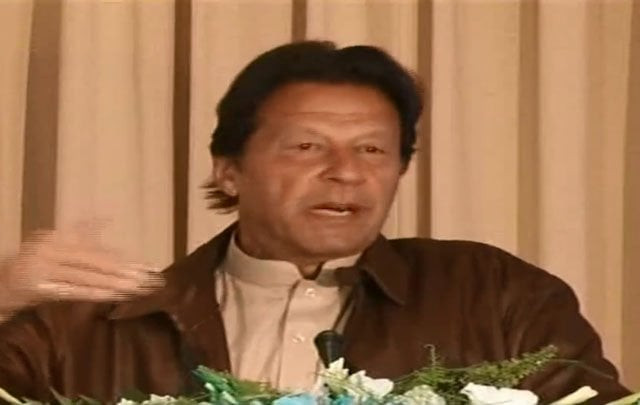2020 will be ‘year of prosperity’: PM
Imran assures hard time is over; govt achieved economic turnaround in 2019

Prime Minister Imran Khan has said that his government has steered the economy out of troubled waters and “2020 will be the year of [economic] growth” for the country.
“The people of Pakistan faced a hard time in 2019, but now, thanks to the Almighty, the economy is stable and I foresee 2020 to be the year of growth for Pakistan,” he said on Wednesday while speaking at the inauguration of the Air University’s new campus.
The ruling Pakistan Tehreek-e-Insaf, which inherited an ailing economy from its predecessors, had to take some unpopular decisions in order to introduce meaningful reforms in critical areas of economic management.
The reforms are now paying off. In November last year, the prime minister appreciated his economic team’s efforts to improve the economic situation after the current account deficit fell by 73.5% compared to the same period last fiscal year.
He said in the year 2019, they succeeded in bringing about an economic turnaround and stability despite facing hard times in the middle of last year when the country’s foreign reserves had shrunk, with the rupee sliding down.
All economic indicators are showing positive signs, he added. “This year, the government will focus on utilising all available resources and provide maximum relief to the people. I’m optimistic that InshaAllah, 2020 will be the year in which the country will witness progress and prosperity.”
Sharing his plans for boosting the economy, he said his government’s initiative to build low-cost houses across the country could act as a catalyst because the project – Naya Pakistan Housing Scheme – would benefit about 40 allied industries.
“Currently, a case is pending with the Lahore High Court over the foreclosure law,” he said, implying that early adjudication would enable the banking sector to extend loan facilities to those applying for housing units as well as ease the mortgage process.
The foreclosure law provides the means for a mortgage lender to take possession and sell a home when the borrower has defaulted on the loan.
Listing the steps for providing relief to the public, the prime minister said the poor segments and the salaried class would be provided with subsidised items at all outlets of the Utility Stores Corporation.
He said his government is also considering issuing ration cards to poor families as “they have already been given the health insurance through the issuance of Sehat Insaf Cards.” Here the premier also mentioned the Langar (free meals) scheme that he said is being introduced in shanty settlements to cater to the needs of the downtrodden.
“Moreover, a network of Panahgahs (shelter homes) has been established in Lahore, Islamabad, Rawalpindi and Peshawar, for free-of-charge lodging and dining facilities for the poor,” he added.
The prime minister said tourism also has immense potential as the tourists flow in the country has doubled during the last two years due to an improved security situation.
“The world has recognised this as was evident from the recent reports of Condé Nast Traveller and UK Backpacker. Malaysia is earning $20 billion, Turkey ($40 billion) and Switzerland ($80 billion) annually from the tourism sector,” he mentioned.
The prime minister reiterated his vision to transform Pakistan on the model of State of Madina, which, he said, is “a tried and tested model” in human history based on the creation of a humanitarian system leading to the rise of a great nation.
“The welfare State of Madina had three basic principles of social security, rule of law and emphasis on seeking of knowledge.”
He said the world today is moving at a fast pace in scientific and technological fields. He referred to artificial intelligence (AI), which, he said, is bringing about a revolution in the world and stressed that the country's institutions should take benefit from the “watershed moment”.
“There should be some out of the box strategy for giving high priority to the education sector as the nation has capabilities to excel despite limited financial resources,” he said.
Meeting on commodity prices Imran Khan expressed his deep concern over adulteration of food and said the elements involved in this heinous crime do not deserve any mercy.
“Such people are playing with the life and health of the people. Strict action should be taken against them,” Imran said chairing a high-level meeting held to take stock of prices of essential commodities.
In the past, governments didn’t keep a check on prices of essential commodities and adulteration, he said. There should be a comprehensive plan to eliminate the demand and supply gap.
The present government is paying close attention to these matters, he added.
He said every effort should be made to check adulteration of food and modern technology should be utilised. “Special attention should be given to the elimination of adulteration and hoarding in major cities,” he said.
Surprise visit of a shelter home
Separately, the prime minister paid a surprise visit to the Tarlai Panahgah and inquired about the existing facilities being provided there, said the PM Office in a press release.
He also took a round of the facility and met the people staying there. He assured them that the government would take similar steps to improve their economic conditions.
The people, mainly labourers, lodging in the Panahgah, expressed their pleasure to find the prime minister among them.



















COMMENTS
Comments are moderated and generally will be posted if they are on-topic and not abusive.
For more information, please see our Comments FAQ